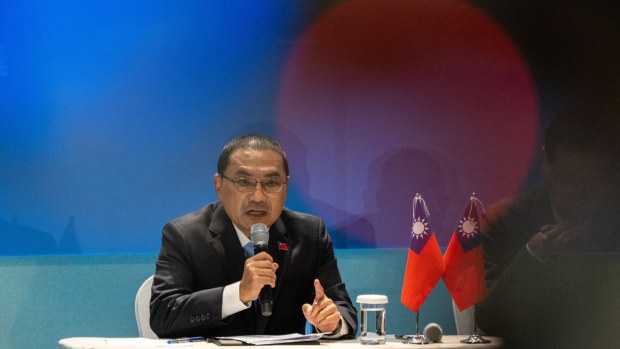Jan 11, 2024
Taiwan’s China-Friendly Challenger Rules Out Unification Talks
, Bloomberg News

(Bloomberg) -- Taiwan’s opposition party in favor of closer ties with China ruled out unification talks with Beijing if it wins Saturday’s election, emphasizing the difficulties Chinese President Xi Jinping faces in bringing the island under his control.
“During my tenure I will not address the issue of unification,” Kuomintang’s presidential candidate Hou Yu-ih said on Thursday at a briefing in Taipei. “Cross-strait relations cannot be unilateral.”
Hou’s comments appeared aimed at allaying concerns among Beijing-wary voters that the KMT, which supports eventual unification with China, would immediately give up Taiwan’s cherished democracy and autonomy if it were to return to power.
The Chinese Communist Party views the island as a breakaway territory that must be brought under its control, by force if necessary — a move that would risk drawing the US into a war with China.
Hou said Taiwan must strengthen its defense capabilities before starting serious cross-strait negotiations. “If we aren’t prepared then it would too dangerous,” he added. “No matter what China thinks, I’ll always be on the side of mainstream public opinion in Taiwan.”
Despite Hou’s pledge, a win for the KMT would give Beijing a more willing negotiating partner in Taipei eight years after it cut off all top-level communication with the current government of President Tsai Ing-wen.
In his annual new year address, Xi reiterated his party’s position that China will “surely be reunified” — an allusion to Taiwan. This message was reinforced earlier this week by Beijing’s top envoy in Washington, Xie Feng, in a virtual speech in Atlanta.
Since she came into power in 2016, Tsai has pushed back against Chinese efforts to isolate Taiwan by expanding links with the US and “like-minded” partners, and reducing economic ties with China. She is set to step down in May after serving a maximum two terms.
Vice President Lai Ching-te, who is running against Hou for the presidency, has indicated he would continue Tsai’s policies.
Hou warned at Thursday’s briefing that the status quo across the strait — the delicate political balancing act whereby Taiwan retains its de facto independence without formally declaring it — had shifted under Tsai, leaving the island at risk of invasion by China.
“We are on the brink of war. We constantly have daily incursions by China,” he said, highlighting concern over an air raid alert earlier this weak triggered by a Chinese satellite launch. “If that’s not dealt with carefully, who knows if a war will break out from a misunderstanding or a miscalculation.”
His remarks over a possible impending war echo comments from top Chinese official Zhang Zhijun earlier this month warning Taiwan’s election is a choice between “peace and war.”
©2024 Bloomberg L.P.





